英语复习常用动词习惯用法
英语复习常用动词习惯用法
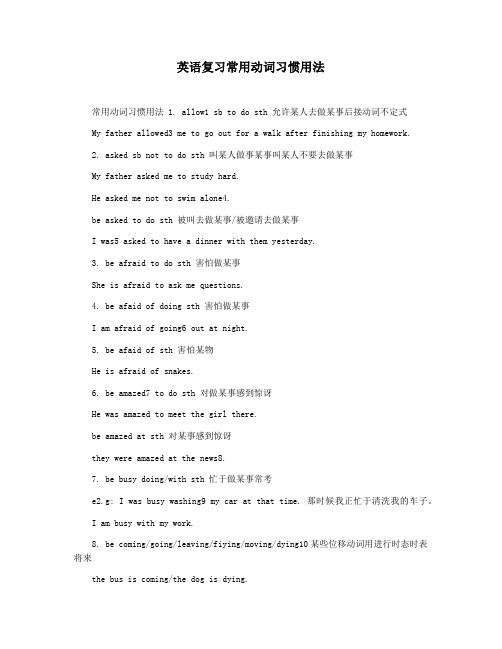
英语复习常用动词习惯用法常用动词习惯用法 1. allow1 sb to do sth 允许某人去做某事后接动词不定式My father allowed3 me to go out for a walk after finishing my homework.2. asked sb not to do sth 叫某人做事某事叫某人不要去做某事My father asked me to study hard.He asked me not to swim alone4.be asked to do sth 被叫去做某事/被邀请去做某事I was5 asked to have a dinner with them yesterday.3. be afraid to do sth 害怕做某事She is afraid to ask me questions.4. be afaid of doing sth 害怕做某事I am afraid of going6 out at night.5. be afaid of sth 害怕某物He is afraid of snakes.6. be amazed7 to do sth 对做某事感到惊讶He was amazed to meet the girl there.be amazed at sth 对某事感到惊讶they were amazed at the news8.7. be busy doing/with sth 忙于做某事常考e2.g: I was busy washing9 my car at that time. 那时候我正忙于清洗我的车子。
I am busy with my work.8. be coming/going/leaving/fiying/moving/dying10某些位移动词用进行时态时表将来the bus is coming/the dog is dying.9. be excited11 to do sth 对做……感到兴奋Jacky was excited to travel12 there by plane.be excited at sthLily13 was excited at his words.be excited about doing sthhe was excited about passing the exam14 without going overing books.10. be frightened15 to do sth 害怕去做某事Sam is frightened to ride a horse.11. be glad/happy to do sth 高兴去做某事she is happy to clean the blackboard with me.be pleased16 to do sth高兴做某事she was pleased to help the old man yesterday.be pleased with sth 对某事感到高兴/满意the teacher was pleased with my answer.12. be interested17 in sth/doing sth 对某事感兴趣/对做某事感兴趣she is interested in swimming in the river.My btother is interested in Chinese.13. be/get ready for/to do sthBe ready for sth 为某事做好了准备We are ready for the exam.Be ready to do sth 为做某事做好了准备We are ready to have a birthday party for her.get ready for sth为某事在做准备We are getting ready for the exam.get ready for sth 为做某事而做准备13. be sorry to do sth 对做某事感到抱歉14. be surprised18 to do sth 对做某事感到惊奇be surprised at sth 对某事感到惊奇15. be worth19 doing sth 值得做某事worth 后接动词-ing形式,常考16. begin to do sthbegin/start to do/doing sth 开始去做某事17. can/be able20 to afford21 to buy sth 有能力购买供……18. can/may/must do sth could/would22/should/might do sth19. can’t wait to do sth 迫不急待地去做某事20. decide23 to do sth 决定去做某事make up one’s mind24 to do sth 下决心去做某事常考make a decision25 to do sth 对做某事作出决定21. deserve26 to do sth 值得/应该做……22. encourage27 sb to do sth 鼓励某人去做某事23. enjoy doing sth 乐意去做某事24. expect28 sb to do sth 期望去做某事25. fail29 to do sth 做某事失败succeed30 doing sth 成功做了某事26. finish doing sth 做完某事后接动词-ing形式常考27. follow sb to do sth 跟随某人去做某事28. get sb to do sthmake sb do sthlet sb do sth 让某人做某事后接动词原形29. get/have a chance31 to do sth 得到一个做某事的机会30. give/pass/show/lend/sell sb sth/sth to sbbuy/get/bring sb sth/sth for sb31. go on to do sth 继续做事常考go on doing sth 继续做事常考32. hate32 to do/doing sth 讨厌/不喜欢做某事33. have fun doing sth34. have problems33 doing sth 做某事遇到困难35. have sb do sthhave sth donehave sth to do 工有事要做36. hear sb do sth 听到某人做某事后接动词原形,常考hear sb doing sth 听到某人正在做某事常见37. help to do sth 帮忙做某事help sb to do sth 帮助某人做某事38. hope/wish to do sth 希望做某事wish sb to do sth 希望某人做某事39. I t seems35 that 这像是……后接从句seem34 to do sthseem +adj40. It’s + adj+for sb to do sth .It’s+adj +of sb to do sthe.g: It’s glad for him to hear the news.41. It takes sb some time/money to do sth . 花费某人多长时间做某事常考42. pay36 …for… cost37 spend…on….. it take …to do sth43. It’s best for sb to do sth. 对某人来说做某事是最好的had38 better do sth 最好做某事注意had没有时态和人称的变化,better后接动词原形44. It’s time for sb to do sth 是某人做某事的时候了45. keep ondoing sth 坚持做某事常考keep sb doing sth 让某人做某事常考keep sb from doing sth 阻止某人做某事常考keep sb/sth +adjkeep the book for 2 days 借这本书两天不要用borrow或lend46. learn to do sth 学做某事learn sth from sb 向某人学习47. like to do/doing sth 喜欢做某事like sb to do sth 喜欢某人做某事48. need to do sthneed doing sth/to be doneneed sth needn’t do sth需要做某事49. prefer39 to do sth rather40 than do sth 宁愿……而不愿……常考prefer doing sth to doing sth 喜欢做……胜过做……e.g: I prefer reading41 books to going shopping. 比起购物来,我更爱读书。
高中英语:16种时态的谓语动词形式和具体用法

高中英语:16种时态的谓语动词形式和具体用法【1】一般现在时(do/does;is/am/are)①表示现在的情况、状态或特征。
例:He is a student.他是一个学生。
②表示经常性、习惯性动作。
例:He always helps others.他总是帮助别人。
③客观事实和普遍真理。
例:The earth moves the sun.地球绕着太阳转。
④表示一个按规定、计划或安排要发生的动作。
仅限于某些表示“来、去、动、停、开始、结束、继续”等的动词,可以与表示未来时间的状语搭配使用。
常见的用法是:飞机、火车、轮船、汽车等定期定点运行的交通方式。
例:The next train leaves at 3 o'clock this afternoon.下一趟火车今天下午3点开车。
⑤在时间、条件和让步状语从句中经常用一般现在(有时也用现在完成时)表示将的来事情。
(即:主将从现原则)例:I will call you as soon as I arrive at the airport.我一到机场就会给你打电话。
When you have finished the report, I will have waited for about 3 hours.等你完成这份报告的时候,我就已经等了将近3个小时了。
【2】现在进行时(am/is/are/doing)①表示此时此刻正在发生的事情。
例:He is listning to the music now.他现在正在听音乐。
②表示目前一段时间内一直在做的事情,但不一定此时此刻正在做。
例:I am studying computer this term.这个学期我一直在学习计算机。
③现在进行时可以表示将来的含义。
a. 瞬时动词的进行一定表将来。
例: I am leaving.我要离开了。
b. 持续动词的进行只有有将来的时间状语或有将来语境中才表将来。
英语复习常用动词习惯用法
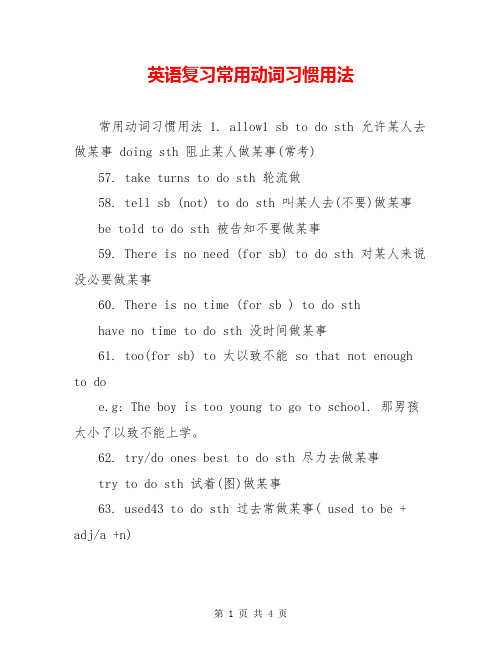
英语复习常用动词习惯用法常用动词习惯用法 1. allow1 sb to do sth 允许某人去做某事 doing sth 阻止某人做某事(常考)57. take turns to do sth 轮流做58. tell sb (not) to do sth 叫某人去(不要)做某事be told to do sth 被告知不要做某事59. There is no need (for sb) to do sth 对某人来说没必要做某事60. There is no time (for sb ) to do sthhave no time to do sth 没时间做某事61. too(for sb) to 太以致不能 so that not enough to doe.g: The boy is too young to go to school. 那男孩太小了以致不能上学。
62. try/do ones best to do sth 尽力去做某事try to do sth 试着(图)做某事63. used43 to do sth 过去常做某事( used to be + adj/a +n)e.g: Mr wang used to be a teacher worker. 王先生过去是一位工人。
I used to live in the country. 过去我住在农村。
64. want/would like to do sth 想做want/would like sb to do sth 想某人做feel like doing sth 喜爱做某事(注意like后接动词ing形式)65. warn44 sb (not) to do sth 警告某人做某事(或不要做某事)66. Why dont you do sthWhy not do sth ( 为什么不(表建议的句型,注意用动词原形) )表示建议的句型还有:What How about(如果是动词,要用ing形式)Shall we67. Would you like (sb) to do sth Yes, Id love to .68. Would you mind doing sth 你介意做某事吗Never mind/Not at all/of course45 not/certainlynot . (从不介意/一点也不介意/当然不会了)69. Would you please (not) do sth 你可不可以不做70. finish doing sth enjoy doing sth practise doing sth be good at doing sth be good at doing sth thank you for doing sth stop doing sth be good at doing sth give up doing sth mind doing sth stop sb from doing sth go on doing sth be busy doing sthsee/hear/watch sb doing sth feel like doing sth hate doing sth like doing sth do well in doing sth be afraid of doing sth be interested in doing sth make a contribution46 to sth/doing sth71. 非延续性动词(终止性动词)1.buy---have(has)had2.borrow---have(has)kept3.leave---have(has)been away4.go ---have(has)been away/ine ---have(has)here/in6.die47 ---have(has)been dead487.join---have(has)been a member of/in8.begin---have(has)on 8.stop---have(has)been overexample: 他的狗死了3天了.: His dog has been dead for three days. It is three days since49 his dogdied50. His dog died three days ago.72. 感官动词:(主动语态不带to)1.hear/see/watch sb do sth 或 2. hear/see/watch sb doing sth1. We often hear him sing the song.2. I saw51 him swimming in the river just now.被动语态带to:1. He is often heard to sing the song.役使动词: (主动语态不带to) make/let sb do sth.His father often makes him do this and that.被动语态带to:He is often made52 to do this and that by his father.。
初中英语常用动词习惯用法总结
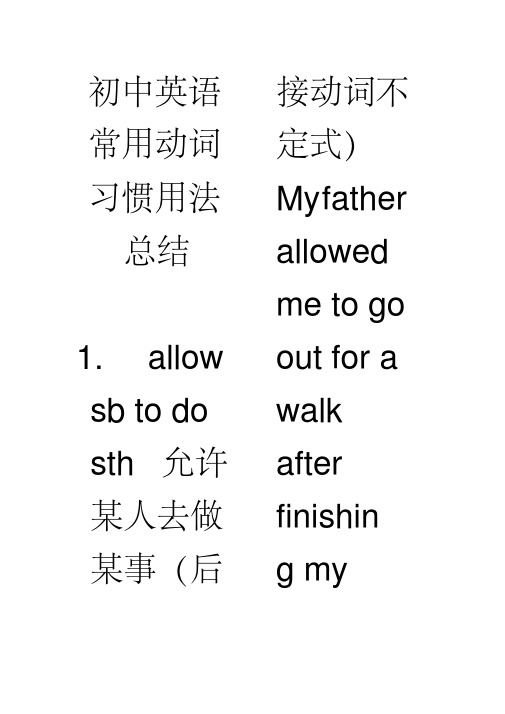
I am
was busy busy with
washing my work.
my car at 8. be
that time. coming/g
那时候我 oing/lea
正忙于清 ving/fiy
洗我的车 ing/movi
子。
ng/dying
(某些位
移动词用
进行时态 时表将 来) the bus is coming/t he dog is dying. 9. be excited to do sth
have a
afraid to
dinner
ask me
with them question
yesterday s.
.
4. be sth 害
afaid of 怕某物
doing sth He is
害怕做某 afraid of
事
snakes.
I am
6. be
afraid of amazedto
going out do sth
28.
29. get
让某人做 /have a
某事(后接 chance to
动词原形) do sth
get sb to 得到一个
do sth
做某事的
make 机会
sb do sth 30. giv
e/pass/s
how/lend /sell sb sth/sth to sb
ed in
We are
Chinese. ready for
13.
the exam.
be/get
Be ready
ready
to do sth
for/to do 为做某事
英语复习常用动词习惯用法

英语复习常用动词习惯用法常用动词习惯用法大家有知道的吗?如果没有,可以看小编总结的哦!接下来,小编给大家准备了英语复习常用动词习惯用法,欢迎大家参考与借鉴。
英语复习常用动词习惯用法常用动词习惯用法 1. allow1 sb to do sth 允许某人去做某事(后接动词不定式)My father allowed3 me to go out for a walk after finishing my homework.2. asked sb (not) to do sth 叫某人做事某事(叫某人不要去做某事)My father asked me to study hard.He asked me not to swim alone4.be asked to do sth 被叫去做某事/被邀请去做某事I was5 asked to have a dinner with them yesterday.3. be afraid to do sth 害怕做某事She is afraid to ask me questions.4. be afaid of doing sth 害怕做某事I am afraid of going6 out at night.5. be afaid of sth 害怕某物He is afraid of snakes.6. be amazed7 to do sth 对做某事感到惊讶He was amazed to meet the girl there.be amazed at sth 对某事感到惊讶they were amazed at the news8.7. be busy doing/with sth 忙于做某事(常考)e2.g: I was busy washing9 my car at that time. 那时候我正忙于清洗我的车子。
I am busy with my work.8. be coming/going/leaving/fiying/moving/dying10(某些位移动词用进行时态时表将来)the bus is coming/the dog is dying.9. be excited11 to do sth 对做……感到兴奋Jacky was excited to travel12 there by plane.be excited at sthLily13 was excited at his words.be excited about doing sthhe was excited about passing the exam14 without going overing books.10. be frightened15 to do sth 害怕去做某事Sam is frightened to ride a horse.11. be glad/happy to do sth 高兴去做某事she is happy to clean the blackboard with me.be pleased16 to do sth高兴做某事she was pleased to help the old man yesterday.be pleased with sth 对某事感到高兴/满意the teacher was pleased with my answer.12. be interested17 in sth/doing sth 对某事感兴趣/对做某事感兴趣she is interested in swimming in the river.My btother is interested in Chinese.13. be/get ready for/to do sthBe ready for sth 为某事做好了准备We are ready for the exam.Be ready to do sth 为做某事做好了准备We are ready to have a birthday party for her.get ready for sth为某事在做准备We are getting ready for the exam.get ready for sth 为做某事而做准备13. be sorry to do sth 对做某事感到抱歉14. be surprised18 to do sth 对做某事感到惊奇be surprised at sth 对某事感到惊奇15. be worth19 doing sth 值得做某事(worth 后接动词-ing形式,常考)16. begin to do sthbegin/start to do/doing sth ( 开始去做某事 )17. can/be able20 to afford21 (to buy) sth 有能力购买(供)……18. can/may/must do sth could/would22/should/might do sth19. can’t wait to do sth 迫不急待地去做某事20. decide23 to do sth 决定去做某事make up one’s mind24 to do sth 下决心去做某事(常考)make a decision25 to do sth 对做某事作出决定21. deserve26 to do sth 值得/应该做……22. encourage27 sb to do sth 鼓励某人去做某事23. enjoy doing sth 乐意去做某事24. expect28 (sb) to do sth 期望去做某事25. fail29 to do sth 做某事失败succeed30 doing sth 成功做了某事26. finish doing sth 做完某事(后接动词-ing形式)(常考)27. follow sb to do sth 跟随某人去做某事28. get sb to do sthmake sb do sthlet sb do sth (让某人做某事(后接动词原形))29. get/have a chance31 to do sth 得到一个做某事的机会30. give/pass/show/lend/sell sb sth/sth to sbbuy/get/bring sb sth/sth for sb31. go on to do sth 继续做事(常考)go on doing sth 继续做事(常考)32. hate32 to do/doing sth 讨厌/不喜欢做某事33. have fun doing sth34. have problems33 doing sth 做某事遇到困难35. have sb do sthhave sth donehave sth to do 工有事要做36. hear sb do sth 听到某人做某事(后接动词原形,常考)hear sb doing sth 听到某人正在做某事(常见)37. help to do sth 帮忙做某事help sb (to) do sth 帮助某人做某事38. hope/wish to do sth 希望做某事wish sb to do sth 希望某人做某事39. I t seems35 that 这像是……(后接从句)seem34 to do sthseem +adj40. It’s + adj+(for sb) to do sth .It’s+adj +(of sb) to do sthe.g: It’s glad for him to hear the news.41. It takes sb some time/money to do sth . 花费某人多长时间做某事(常考)42. pay36 …for… cost37 spend…on….. it take …to do sth43. It’s best for sb to do sth. 对某人来说做某事是最好的had38 better do sth 最好做某事(注意had没有时态和人称的变化,better后接动词原形)44. It’s time for sb to do sth 是某人做某事的时候了45. keep (on)doing sth 坚持做某事(常考)keep sb doing sth 让某人做某事(常考)keep sb from doing sth 阻止某人做某事(常考)keep sb/sth +adjkeep the book for 2 days 借这本书两天(不要用borrow或lend)46. learn to do sth 学做某事learn sth from sb 向某人学习47. like to do/doing sth 喜欢做某事like sb to do sth 喜欢某人做某事48. need to do sthneed doing sth/to be doneneed sth needn’t do sth(需要做某事)49. prefer39 to do sth rather40 than do sth 宁愿……而不愿……(常考)prefer doing sth to doing sth 喜欢做……胜过做……e.g: I prefer reading41 books to going shopping. 比起购物来,我更爱读书。
常用动词的用法

常用动词的用法介绍常用动词的用法动词是句子中最关键的词类之一,用于描述人、物或事情的行为、状态和变化。
在英语中,常用动词的正确使用对于构建准确、流畅的句子至关重要。
本文将介绍一些常用动词的用法,并给出相应的例句,以帮助读者提高语言表达的准确性和流畅性。
1. Do(做,完成):- 用作实义动词时,表示执行特定的动作或任务。
例句:I do my homework every evening.(我每晚做作业。
) - 在疑问句或否定句中,用于表示一般动作的否定或疑问。
例句:Do you like ice cream?(你喜欢冰淇淋吗?)2. Have(有,拥有):- 表示某人/某物拥有或经历了某种状态或经历。
例句:She has a beautiful house.(她有一所漂亮的房子。
) - 表示完成某项动作或做过某种事情。
例句:I have visited Paris twice.(我去过巴黎两次。
)3. Be(是,存在):- 表示身份、状态或特征。
例句:I am a student.(我是一名学生。
)- 表示存在或位置。
例句:The book is on the table.(书在桌子上。
)4. Go(去,进行):- 表示移动到某个地方。
例句:I want to go to the park.(我想去公园。
)- 表示进行某种活动。
例句:She goes swimming every weekend.(她每个周末去游泳。
)5. Make(制作,做):- 表示创造、制造或完成某件事情。
例句:She makes delicious cakes.(她做出美味的蛋糕。
) - 表示强迫或引起某种情感或感觉。
例句:The movie makes me feel sad.(这部电影让我感到悲伤。
)6. Take(拿,带):- 表示获取、接受或拿走某物。
例句:Can you take this package for me?(你能帮我拿这个包裹吗?)- 表示进行某种行动或采取某种方式。
习惯用法
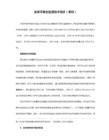
bring up 抚养
bring down 降低
bring out 出版
call
call off 取消
call for 邀约;请求
call in 召集
call on 拜访
call up 召集,动员;打电话;使人想起
=cannot hold back from doing Sth.
=cannot keep back from doing Sth.
=cannot choose + 动词原形
=cannot but + 动词原形
cannot help but do sth. 禁不住要做某事(用不带to的动词不id somebody in
aim at
apologetic for
apologize for
apprehensive of 对...担忧
aware of
awkward at
be afraid of
be capable of
be engaged in
be fond of
reject
relinquish
relish vt.爱好;喜欢
renounce
report
require
resent v.愤恨, 怨恨
resist
risk
sanction
shirk vi.逃避, 推卸
vt.逃避
shun vt.避开, 避免
stand
substantiate vt.使实体化, 证实
call back 回电话
consist
(完整版)动词用法总结

(完整版)动词用法总结动词用法总结动词是语言中最基本的词类之一,用于描述动作、状态或发生的事件。
在英语中,动词的用法非常多样化,因此了解和掌握不同动词的用法是非常重要的。
以下是一些常见的动词用法总结:一般现在时 (Simple Present)- 表示经常性、惯性的动作或事实。
- 例句:He plays tennis every Saturday.(他每个星期六打网球。
)现在进行时 (Present Continuous)- 表示正在进行的动作。
- 例句:She is reading a book right now.(她正在看书。
)一般过去时 (Simple Past)- 表示过去发生的动作或事实。
- 例句:They visited their grandparents last weekend.(他们上个周末去探望了他们的祖父母。
)过去进行时 (Past Continuous)- 表示过去某一时刻正在进行的动作。
- 例句:I was studying when she called.(她打电话时,我正在研究。
)一般将来时 (Simple Future)- 表示将来要发生的动作或状态。
- 例句:We will go on vacation next month.(我们下个月要去度假。
)祈使句 (Imperative)- 表示命令、建议或请求。
- 例句:Please close the door.(请关上门。
)现在完成时 (Present Perfect)- 表示过去发生的动作对现在的影响。
- 例句:I have finished my homework.(我完成了我的家庭作业。
)以上是一些常见的动词用法总结。
掌握这些用法可以帮助你更准确地使用动词,使你的语言表达更加流利和地道。
还有其他更复杂的动词用法,需要根据具体语境进行学习和掌握。
小学英语动词知识点总结

小学英语动词知识点总结一、动词的时态1. 现在时:表示当前的状态或习惯性的动作,有一般现在时、现在进行时和现在完成时。
eg: He lives in New York. (一般现在时)She is reading a book. (现在进行时)They have finished their homework. (现在完成时)2. 过去时:表示过去发生的动作或状态,有一般过去时、过去进行时和过去完成时。
eg: He worked in a factory last year. (一般过去时)She was washing her hands when I called her. (过去进行时)They had already left when we arrived. (过去完成时)3. 将来时:表示将要发生的动作或状态,有一般将来时和将来进行时。
eg: He will go to the park tomorrow. (一般将来时)She is going to visit her grandparents next weekend. (将来进行时)4. 现在完成时:表示过去某个时间点开始,一直持续到现在的动作或状态。
eg: I have lived in this city for ten years.5. 过去完成时:表示在过去某个时间点之前已经完成的动作或状态。
eg: They had studied English for three years before they went to the UK.6. 被动语态:表示主语是动作的接受者,而不是执行者。
eg: The car was repaired by the mechanic.二、动词的时态也会被表示方式:1. 一般式:表示一般的动作或状态。
eg: She plays the piano every evening.2. 进行式:表示正在进行的动作。
动词习惯用法
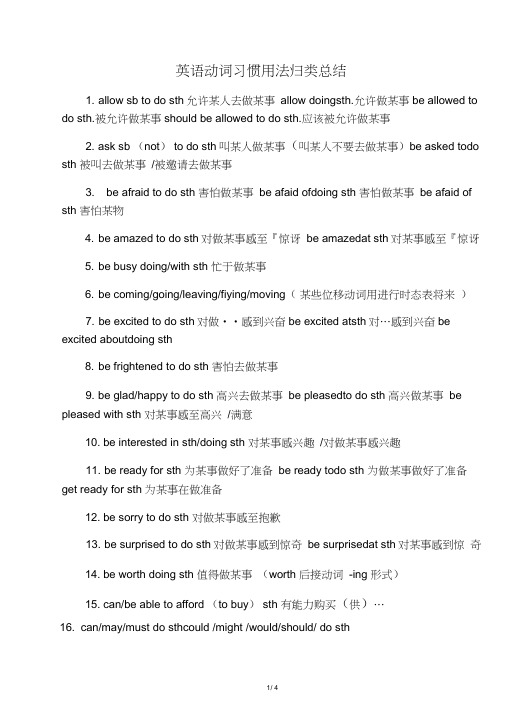
英语动词习惯用法归类总结1. allow sb to do sth允许某人去做某事allow doingsth.允许做某事be allowed to do sth.被允许做某事should be allowed to do sth.应该被允许做某事2. ask sb (not) to do sth叫某人做某事(叫某人不要去做某事)be asked todo sth 被叫去做某事/被邀请去做某事3. be afraid to do sth 害怕做某事be afaid ofdoing sth 害怕做某事be afaid of sth 害怕某物4. be amazed to do sth对做某事感至『惊讶be amazedat sth对某事感至『惊讶5. be busy doing/with sth 忙于做某事6. be coming/going/leaving/fiying/moving(某些位移动词用进行时态表将来)7. be excited to do sth对做••感到兴奋be excited atsth对…感到兴奋be excited aboutdoing sth8. be frightened to do sth 害怕去做某事9. be glad/happy to do sth 高兴去做某事be pleasedto do sth 高兴做某事be pleased with sth 对某事感至高兴/满意10. be interested in sth/doing sth 对某事感兴趣/对做某事感兴趣11. be ready for sth 为某事做好了准备be ready todo sth 为做某事做好了准备get ready for sth 为某事在做准备12. be sorry to do sth 对做某事感至抱歉13. be surprised to do sth对做某事感到惊奇be surprisedat sth对某事感到惊奇14. be worth doing sth 值得做某事(worth 后接动词-ing 形式)15. can/be able to afford (to buy) sth 有能力购买(供)…16. can/may/must do sthcould /might /would/should/ do sth17. can ' t wait to do s迫不急待地去做某事18. complain( to sb) about sth(向某人)抱怨某事19. decide to do sth 决定去做某事decide on doingsth.make up one ' s mind to dosth 下决心去做某事make a decision to do sth对做某事作出决定20. deserve to do sth值得/应该做…21. e ncourage sb to do sth鼓励某人去做某事22. enjoy doing sth乐意去做某事23. expect (sb) to do sth 期望去做某事24. fail to do sth 做某事失败succeed in doingsth成功做了某事25. finish doing sth做完某事(后接动词-ing形式)26. follow sb to do sth跟随某人去做某事27. let sb do sth /make sb do sth /get sb to do sth让某人做某事28. get/have a cha nee to do sth得到一个做某事的机会29. give/pass/show/lend/sell sb sth/sth to sbbuy/get/bring sb sth/sthfor sb30. go on to do sth 继续做(另一件)事go on doingsth 继续做(同一件)事31. hate to do/doing sth 讨厌/不喜欢做某事32. have fun doing sth33. have trouble/problems doing sth 做某事遇到困难34. have sb do sth让某人做某事have sth done让某事被做have sth to do有事要做35. hear sb do sth听到某人做某事(后接动词原形)hear sb doingsth听到某人正在做某事36. .help (to) do sth帮忙做某事help sb (to) dosth帮助某人做某事37. hope/wish to do sth 希望做某事wish sb to dosth 希望某人做某事38」t seems that 这像是. 后接从句)seem to do sthseem +adj39.It 's + adj+(for sb) to do sth .It 's+adj +(of sb)to do sth40.It takes sb some time/money to do sth .花费某人多长时间做某事41.pay …for, ・cost, spend •…on •厂it take •…to do sth42.It ' s best for sb to do对t某人来说做某事是最好的had better(not) do sth 最好(不)做某事(注意had 没有时态和人称的变化, better 后接动词原形)43.It ' s time for sb to do是某人做某事的时候了44.keep (on)doing sth 坚持做某事keep sb doingsth让某人做某事keep sb from doing sth 阻止某人做某事keep sb/sth +adjkeep the book for 2 days 借这本书两天(不要用borrow 或lend)45.learn to do sth 学做某事learn sth from sb 向某人学习46.like to do/doing sth 喜欢做某事like sb to do sth 喜欢某人做某事47. something to eat/drink 一些吃/喝的东西48. spend some time (in)doing sth /on sth 花费时间做某事spend somemoneyon sth/doing sth 买 .. 花了多少钱49. sth is hard/difficult/easy to do .做好某事很难/容易50. .stop to do sth 停下来去做某事(另一件事)stop doing sth 停止做某事stop/keep/prevent sb from doingsth 阻止某人做某事51. suggest doi ng sth 建议做某事52. succeed in doi ng sth 成功做某事53. take turns to do sth 轮流做...54. tell sb (not) to do sth 叫某人去(不要)做某事be told to dosth 被告知不要做某事55. There is no need (for sb) to do sth对某人来说没必要做某事56. There is no time (for sb ) to do sthhave no time todo sth 没时间做某事57. too…(for sb) to do sth太…以致不能做某事58. try/do one ' s best to d尽s力去做某事try to do sth 努力做某事try doing sth 尝试做某事59. used to do sth 过去常做某事60. want/would like to do sth 想做... want/would like sb todo sth想某人做... feel like doing st喜爱做某事(注意like后接动词ing形式)61. warn sb (not) to do sth 警告某人做某事(或不要做某事)62. Would you like (sb) to do sth ?Yes, I ' d love to .63. Would you mind doing sth ?你介意做某事吗?Never mind/Notat all/of course not/certainly not .64. Would you please (not) do sth你可不可以(不)做.. ?65. finish doing sthenjoy doing sthpractice doing sthbegood at doing sthstop doing sththank you for doing sthbe good atdoing sthgive up doing sthmind doing sthstop sb fromdoing sthgo on doing sthbe busy doing sthfeel like doing sthhate doing sthlike doing sthdo well in doing sthbe afraid ofdoing sthbe interested in doing sthsee/hear/watch sbdoing sthmake a contribution to sth/doing sth。
初中英语语法一本通 22常用动词习惯用法及句型

第八章常用动词习惯用法及句型一、常用动词习惯用法。
1、allow sb to do sth 允许某人去做某事(后接动词不定式)allow doing sth 允许做某事(动词-ing形式)2、asked sb (not) to do sth 叫某人做事某事(叫某人不要去做某事)be asked to do sth 被叫去做某事3、be afraid to do sth 害怕做某事4、be afaid of doing sth 害怕做某事5、be amazed to do sth 对做某事感到惊讶be amazed at sth 对做某事感到惊讶6、be busy doing/with sth 忙于做某事(常考)例如:I was busy washing my car at that time. 那时候我正忙于清洗我的车子。
7、be coming/ going/ leaving/ flying/ moving (某些位移动词用进行时态时表将来)8、be excited to do sth 对做……感到兴奋be excited at sthbe excited about doing sth9、be frightened to do sth 害怕去做某事10、be glad/happy to do sth 高兴去做某事be pleased to do sth = be pleased with sth 对某事感到高兴11、be interested in sth/doing sth 对某事感兴趣/对做某事感兴趣12、be ready to do sth = get ready to do sth13、be sorry to do sth 对做某事感到抱歉14、be surprised to do sth 对做某事感到惊奇be surprised at sth 对某事感到惊奇15、be worth doing sth 值得做某事(worth 后接动词-ing形式,常考)16、begin to do sthbegin/start to do/doing sth17、can/be able to afford (to buy) sth 有能力购买(供)……18、can/may/must do sth could/would/should/might do sth19、can’t wait to do sth 迫不急待地去做某事20、decide to do sth 决定去做某事make up one’s mind to do sth 下决心去做某事(常考)make a decision to do sth 对做某事作出决定21、deserve to do sth 值得/应该做……22、encourage sb to do sth 鼓励某人去做某事23、enjoy doing sth 乐意去做某事24、expect (sb) to do sth 期望去做某事25、fail to do sth 做某事失败succeed doing sth 成功做了某事26、finish doing sth 做完某事(后接动词-ing形式)(常考)27、follow sb to do sth 跟随某人去做某事28、get sb to do sth = make sb do sth = let sb do sth29、get/have a chance to do sth 得到一个做某事的机会30、give/pass/show/lend/sell sb sth/ sth to sbbuy/get/bring sb sth/ sth for sb31、go on to do sth 继续做事(常考)go on doing sth 继续做事(常考)32、hate to do/doing sth 讨厌/不喜欢做某事33、have fun doing sth34、have problems doing sth 做某事遇到困难35、have sb do sthhave sth donehave sth to do 工有事要做36、hear sb do sth 听到某人做某事(后接动词原形,常考)hear sb doing sth 听到某人正在做某事(常见)37、help to do sth 帮忙做某事help sb (to) do sth 帮助某人做某事38、hope/wish to do sth 希望做某事wish sb to do sth 希望某人做某事39、I t seems that 这像是……(后接从句)seem to do sthseem +adj40、It’s + adj+(for sb) to do sth .It’s+ adj +(of sb) to do sth例如:It’s glad for him to hear the news.41、It takes sb some time to do sth . 花费某人多长时间做某事(常考)42、It’s best for sb to do sth. 对某人来说做某事是最好的had better do sth 最好做某事(注意had没有时态和人称的变化,better后接动词原形)43、It’s time for sb to do sth 是某人做某事的时候了44、keep (on)doing sth 坚持做某事(常考)keep sb doing sth 让某人做某事(常考)keep sb from doing sth 阻止某人做某事(常考)keep sb/sth +adjkeep the book for 2 days 借这本书两天(不要用borrow或lend)45、learn to do sth 学做某事learn sth from sb 向某人学习46、like to do/doing sth 喜欢做某事like sb to do sth 喜欢某人做某事47、need to do sthneed doing sth/to be doneneed do sth48、prefer to do sth rather than do sth 宁愿……而不愿……(常考)prefer doing sth to doing sth 喜欢做……胜过做……例如:I prefer reading books to going shopping. 比起购物来,我更爱读书。
动词学习常见的动词
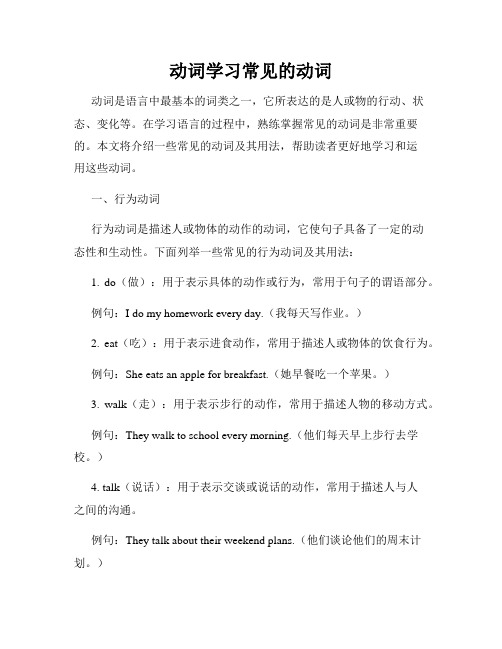
动词学习常见的动词动词是语言中最基本的词类之一,它所表达的是人或物的行动、状态、变化等。
在学习语言的过程中,熟练掌握常见的动词是非常重要的。
本文将介绍一些常见的动词及其用法,帮助读者更好地学习和运用这些动词。
一、行为动词行为动词是描述人或物体的动作的动词,它使句子具备了一定的动态性和生动性。
下面列举一些常见的行为动词及其用法:1. do(做):用于表示具体的动作或行为,常用于句子的谓语部分。
例句:I do my homework every day.(我每天写作业。
)2. eat(吃):用于表示进食动作,常用于描述人或物体的饮食行为。
例句:She eats an apple for breakfast.(她早餐吃一个苹果。
)3. walk(走):用于表示步行的动作,常用于描述人物的移动方式。
例句:They walk to school every morning.(他们每天早上步行去学校。
)4. talk(说话):用于表示交谈或说话的动作,常用于描述人与人之间的沟通。
例句:They talk about their weekend plans.(他们谈论他们的周末计划。
)二、状态动词状态动词是描述人或物体的状态或特征的动词,它使句子更注重表达主语的状态和条件。
下面列举一些常见的状态动词及其用法:1. be(是):表示身份、职业、性格、属性等的动词,常用于构成句子的谓语部分。
例句:He is a doctor.(他是一名医生。
)2. feel(感觉):用于表示感觉或心理状态的动词,常用于描述人的感受或情绪。
例句:I feel happy today.(我今天感到很高兴。
)3. seem(似乎):用于表示某种外在的或表面上的状态,常用于描述事物的外观或现象。
例句:It seems that it will rain soon.(看起来天要下雨了。
)4. appear(出现):用于表示某人或某物的出现,常用于描述情景或事件的发生。
小学英语常见动词用法

小学英语常见动词用法在小学英语的学习中,动词是非常重要的一部分。
动词不仅在句子中充当谓语,表达动作和状态,而且其形式和用法的变化多样,对于小学生来说,掌握常见动词的用法是学好英语的关键。
一、be 动词be 动词包括am、is、are,它们的用法是根据主语的不同而变化的。
当主语是 I 时,用 am,比如:I am a student (我是一名学生。
)当主语是第三人称单数(he、she、it 或者一个人的名字等)时,用is,例如:He is a teacher (他是一位老师。
) She is my friend (她是我的朋友。
) The cat is cute (这只猫很可爱。
)当主语是复数(we、you、they 或者两个及以上的人或物)时,用are,比如:We are happy (我们很开心。
) You are nice (你们很好。
)They are apples (它们是苹果。
)二、have/hashave 表示“有”,其第三人称单数形式是 has。
当主语是第一人称(I、we)、第二人称(you)以及复数(they 等)时,用 have,比如:I have a pen (我有一支笔。
) We have many books (我们有很多书。
) You have a big bag (你有一个大书包。
)They have some toys (他们有一些玩具。
)当主语是第三人称单数(he、she、it 或者一个人的名字等)时,用has,例如:He has a bike (他有一辆自行车。
) She has a new dress (她有一条新裙子。
)三、likelike 表示“喜欢”,后面可以接名词、动词的 ing 形式。
接名词时,比如:I like apples (我喜欢苹果。
) She likes dogs (她喜欢狗。
)接动词的 ing 形式时,例如:He likes playing football (他喜欢踢足球。
常用动词用法简表
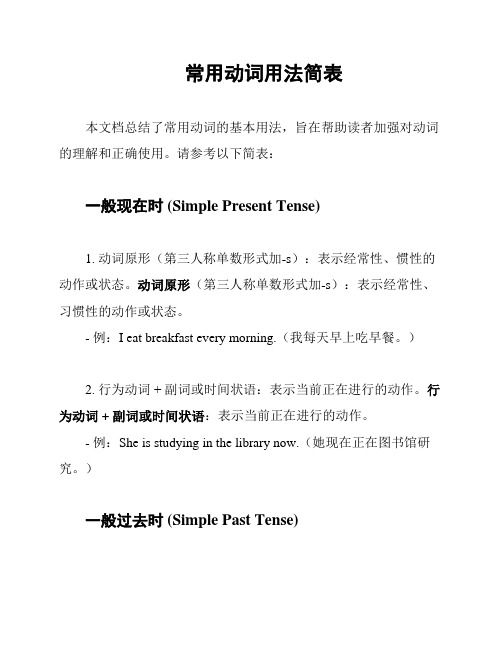
常用动词用法简表本文档总结了常用动词的基本用法,旨在帮助读者加强对动词的理解和正确使用。
请参考以下简表:一般现在时 (Simple Present Tense)1. 动词原形(第三人称单数形式加-s):表示经常性、惯性的动作或状态。
动词原形(第三人称单数形式加-s):表示经常性、习惯性的动作或状态。
- 例:I eat breakfast every morning.(我每天早上吃早餐。
)2. 行为动词 + 副词或时间状语:表示当前正在进行的动作。
行为动词 + 副词或时间状语:表示当前正在进行的动作。
- 例:She is studying in the library now.(她现在正在图书馆研究。
)一般过去时 (Simple Past Tense)1. 动词过去式:表示过去发生的动作或状态。
动词过去式:表示过去发生的动作或状态。
- 例:We visited Paris last summer.(去年夏天我们去了巴黎。
)现在进行时 (Present Continuous Tense)1. be动词 + 动词的现在分词:表示现在正在进行的动作。
be动词 + 动词的现在分词:表示现在正在进行的动作。
- 例:They are watching a movie at the cinema.(他们正在电影院看电影。
)过去进行时 (Past Continuous Tense)1. be动词的过去式 + 动词的现在分词:表示过去某一时刻正在进行的动作。
be动词的过去式 + 动词的现在分词:表示过去某一时刻正在进行的动作。
- 例:I was studying when you called me yesterday.(昨天你给我打电话时,我正在研究。
)一般将来时 (Simple Future Tense)1. will + 动词原形:表示将来发生的动作或状态。
will + 动词原形:表示将来发生的动作或状态。
- 例:She will visit her grandparents next week.(下周她将会去看望她的祖父母。
英语语法动词用法总结

英语语法动词用法总结英语中的动词是句子的核心成分之一,其用法复杂多样。
掌握动词的用法对于学好英语至关重要。
接下来,让我们系统地总结一下英语语法中动词的常见用法。
一、动词的分类1、实义动词实义动词是表示具体动作或状态的动词,如“run(跑)”“eat(吃)”“sleep(睡觉)”等。
实义动词又可分为及物动词和不及物动词。
及物动词:后面需要接宾语才能表达完整的意思,例如“read abook(读书)”中的“read”就是及物动词。
不及物动词:后面不需要接宾语就能表达完整的意思,比如“runfast(跑得快)”中的“run”。
2、系动词系动词用于连接主语和表语,说明主语的状态、性质、特征等。
常见的系动词有“be(am/is/are/was/were)”“seem(似乎)”“look(看起来)”“feel(感觉)”“smell(闻起来)”“taste(尝起来)”“sound(听起来)”等。
3、助动词助动词主要用于构成各种时态、语态、语气等,本身没有实际意义。
常见的助动词有“do/does/did”“have/has/had”“will/would”“shall/should”等。
4、情态动词情态动词表示说话人的态度、情感或推测等,如“can(能够)”“could(能够,过去式)”“may(可能)”“might(可能,过去式)”“must(必须)”“should(应该)”“ought to(应该)”“need(需要)”“dare(敢)”等。
二、动词的时态1、一般现在时表示经常发生的动作、习惯、真理等。
主语是第三人称单数时,动词要发生相应的变化,通常在动词后加“s”或“es”。
例如:“He plays football every day(他每天踢足球。
)”2、一般过去时表示过去发生的动作或存在的状态,动词要用过去式。
例如:“I went to Beijing last year(我去年去了北京。
)”3、一般将来时表示将来要发生的动作或存在的状态,常见的结构有“will +动词原形”和“be going to +动词原形”。
常用英语动词用法

常用英语动词用法英语动词是英语语言中最重要的词类之一,它们的用法灵活多样,掌握好动词的用法对于学好英语至关重要。
在这篇文章中,我们将探讨一些常用英语动词的常见用法。
一、Be 动词(am/is/are)Be 动词是英语中最基本的动词之一,用于表示“是”的概念。
1、 am 用于第一人称单数 I 之后,例如:I am a student (我是一名学生。
)2、 is 用于第三人称单数 he/she/it 之后,比如:He is a doctor (他是一名医生。
)She is very beautiful (她非常漂亮。
)It is a dog (它是一只狗。
)3、 are 用于第二人称 you 以及复数主语之后,像:You are my friend (你是我的朋友。
)We are happy (我们很开心。
)They are teachers (他们是老师。
)Be 动词还可以与现在分词构成进行时态,表示正在进行的动作,例如:I am reading a book (我正在读一本书。
)He is playing football (他正在踢足球。
)二、Have 动词Have 有“有;拥有”的意思,其用法如下:1、当主语是第三人称单数时,要用has,其余人称用have。
例如:I have a pen (我有一支笔。
)She has a car (她有一辆车。
)2、 have/has 还可以与过去分词构成完成时态,比如:I have finished my homework (我已经完成了我的作业。
)He has been to Beijing (他去过北京。
)三、Do 动词Do 主要用于构成疑问句和否定句,以及在一些特定的短语中使用。
1、构成疑问句:Do you like apples? (你喜欢苹果吗?)Does hego to school by bike? (他骑自行车上学吗?)2、构成否定句:I don't know (我不知道。
六年级英语知识点动词短语

六年级英语知识点动词短语动词短语在英语语法中起着重要的作用,它们可以用来增强句子的表达力和准确性。
在六年级英语学习中,学生需要熟练掌握各种常见的动词短语及其用法。
本文将介绍六年级英语知识点中常见的动词短语及其用法。
一、常见动词短语1. Wake up: 醒来I usually wake up at 7 o'clock in the morning.2. Get up: 起床She gets up early and goes for a run every day.3. Go to bed: 上床睡觉Don't forget to brush your teeth before you go to bed.4. Have breakfast/lunch/dinner: 吃早餐/午餐/晚餐My family usually has dinner together in the evening.5. Brush teeth: 刷牙Remember to brush your teeth twice a day.6. Wash face: 洗脸She washes her face with cold water every morning.7. Take a shower: 淋浴I always take a shower before going to bed.8. Go to school: 去上学We need to catch the bus to go to school.9. Do homework: 做作业He spends two hours every day doing his homework.10. Play sports: 进行体育运动They like to play sports in the park on the weekends.11. Watch TV: 看电视She watches TV for an hour every evening.12. Listen to music: 听音乐I like to listen to music while doing my homework.13. Read books: 读书He reads books in the library every Saturday.14. Write a letter: 写信We wrote a letter to our pen pals last week.15. Use a computer: 使用电脑He uses a computer to search for information online.二、动词短语的用法1. 用于描述日常活动动词短语常用于描述日常活动,表示人们的习惯或常规动作。
中考英语《一般现在时》知识点:经常连用的动词
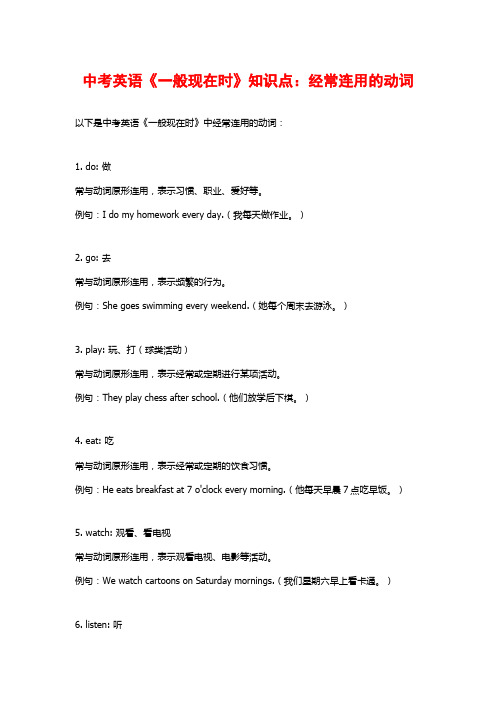
中考英语《一般现在时》知识点:经常连用的动词以下是中考英语《一般现在时》中经常连用的动词:1. do: 做常与动词原形连用,表示习惯、职业、爱好等。
例句:I do my homework every day.(我每天做作业。
)2. go: 去常与动词原形连用,表示频繁的行为。
例句:She goes swimming every weekend.(她每个周末去游泳。
)3. play: 玩、打(球类活动)常与动词原形连用,表示经常或定期进行某项活动。
例句:They play chess after school.(他们放学后下棋。
)4. eat: 吃常与动词原形连用,表示经常或定期的饮食习惯。
例句:He eats breakfast at 7 o'clock every morning.(他每天早晨7点吃早饭。
)5. watch: 观看、看电视常与动词原形连用,表示观看电视、电影等活动。
例句:We watch cartoons on Saturday mornings.(我们星期六早上看卡通。
)6. listen: 听常与动词原形连用,表示经常或定期听音乐、收听广播等活动。
例句:She listens to music before bedtime.(她睡前听音乐。
)7. read: 读常与动词原形连用,表示阅读书籍、杂志、报纸等。
例句:They read books in the library every afternoon.(他们每个下午在图书馆读书。
)8. write: 写常与动词原形连用,表示写日记、写信等活动。
例句:I write a diary every night.(我每晚写日记。
)9. study: 学习常与动词原形连用,表示经常或定期进行学习活动。
例句:He studies math for two hours every day.(他每天学习两个小时数学。
)这些动词的一般现在时形式不随主语的人称和数的变化而改变。
英语单词惯用法(6)

英语单词惯用法(6)下面这些动词和短语习惯上后接“to+动名词”,形成固定的句式。
下面就这些动词和短语的用法加以归纳,并配以练习进行巩固。
1、adapt to doing sth 适应做某事例句:He has adapted to doing that work. 他已经适应做那件工作。
2、admit to doing sth承认做了某事例句:George would never admit to being wrong. 乔治从不认错。
3、amount 意思是做某事,等同于做某事例句:Borrowing money and not returning it amounts to stealing. 借了钱不还就等于偷。
4、apply oneself to doing sth专心致力于做某事例句:They applied themselves to producing bikes. 他们努力生产自行车。
5、apply to doing sth适用于做某事例句:These principles apply to learning maths. 这些原则适用于数学学习。
6、pay attention to doing sth注意做某事例句:Our teachers always pay attention to combining theory with practice. 我们的老师总是注意理论联系实际。
7、contribute to doing sth 促成/有助于做某事例句:Laissez-faire policy result in increase economic activity, but contribute to rising in import. 自由放任政策导致经济活动的增加,但也促进了进口的增长。
8、descend to doing sth 转而提到/堕落到做某事例句:All too soon they will descend to spreading scandal and gossip. 过不了多久他们就会堕落到传播丑闻和谣言的地步。
英语动词习惯搭配

英语动词习惯搭配一、只接动名词做宾语1、be busy doing 忙于做2、be used to doing 习惯于做3、be used for doing 被用来做4、be worth doing 值得做5、by doing 依靠6、can’t help doing 禁不住做[7、consider doing 考虑做8、end up doing 结束做9、enjoy doing 喜欢做10、feel like doing 喜欢做11、finish doing 完成做12、give up doing 放弃做13、have fun doing 开心做14、have trouble/problem/difficulty doing 有困难做15、keep/keep on doing 继续/反复做16、(would you) mind doing 介意做17、practice doing 练习做18、prefer doing…to doing 更喜欢做19、put off doing 推迟做20、spend …doing 花费…做21、stop/prevent/keep sb.…(from) doing 防止某人做某事22、succeed in doing 成功做23、thanks for doing 感谢做二、只接动词不定式做宾语1、advise sb. to do 建议做2、afford to do 支付得起做3、agree to do 同意做4、allow sb. to do 允许某人做5、be able to do 能够做6、be afraid to do 害怕做7、begin to do 开始做8、can’t wait to do 迫不及待做9、decide to do 决定做10、happen to do 碰巧做11、hope to do 希望做12、invite sb. to do 邀请某人做13、learn to do 学习做14、need to do 需要做15、plan to do 计划做16、prefer to do…rather than do 更喜欢做17、pretend to do 假装做18、refuse to do 拒绝做19、start to do开始做20、tell sb. to do 告诉某人做21、try (one’s best) to do尽力做22、used to do 过去经常做23、volunteer (one’s time) to do 自愿做24、want (sb.) to do 想要(某人)做25、wish (sb.) to do 希望(某人)做26、would like to do 愿意做27、What/How/When/Where to do28、It takes sb. st. to do29、It’s difficult/impossible for sb. to do30、I find it difficult to study English三、只接省去to的动词不定式做宾语1、Why not do2、You’d better (not)do3、一感feel二听hear , listen to三让make, let, have四看see, notice, watch, look at半帮助help sb. (to) dohelp (to)do四、接动词不定式和接动名词做宾语1、like doing hate doinglike to do hate to do2、forget doing remember doingforget to do remember to do 3、go on doing stop doinggo on to do stop to do4、try doing[ try to do5 see sb.doingsee sb. do。
- 1、下载文档前请自行甄别文档内容的完整性,平台不提供额外的编辑、内容补充、找答案等附加服务。
- 2、"仅部分预览"的文档,不可在线预览部分如存在完整性等问题,可反馈申请退款(可完整预览的文档不适用该条件!)。
- 3、如文档侵犯您的权益,请联系客服反馈,我们会尽快为您处理(人工客服工作时间:9:00-18:30)。
英语复习常用动词习惯用法常用动词习惯用法 1. allow1 sb to do sth 允许某人去做某事(后接动词不定式)My father allowed3 me to go out for a walk after finishing my homework.2. asked sb (not) to do sth 叫某人做事某事(叫某人不要去做某事)My father asked me to study hard.He asked me not to swim alone4.be asked to do sth 被叫去做某事/被邀请去做某事I was5 asked to have a dinner with them yesterday.3. be afraid to do sth 害怕做某事She is afraid to ask me questions.4. be afaid of doing sth 害怕做某事I am afraid of going6 out at night.5. be afaid of sth 害怕某物He is afraid of snakes.6. be amazed7 to do sth 对做某事感到惊讶He was amazed to meet the girl there.be amazed at sth 对某事感到惊讶they were amazed at the news8.7. be busy doing/with sth 忙于做某事(常考)e2.g: I was busy washing9 my car at that time. 那时候我正忙于清洗我的车子。
I am busy with my work.8. be ing/going/leaving/fiying/moving/dying10(某些位移动词用进行时态时表将来)the bus is ing/the dog is dying.9. be e_cited11 to do sth 对做感到兴奋Jacky was e_cited to travel12 there by plane.be e_cited at sthLily13 was e_cited at his words.be e_cited about doing sthhe was e_cited about passing the e_am14 without going overing books.10. be frightened15 to do sth 害怕去做某事Sam is frightened to ride a horse.11. be glad/happy to do sth 高兴去做某事she is happy to clean the blackboard with me.be pleased16 to do sth高兴做某事she was pleased to help the old man yesterday.be pleased with sth 对某事感到高兴/满意the teacher was pleased with my answer.12. be interested17 in sth/doing sth 对某事感兴趣/对做某事感兴趣she is interested in swimming in the river.My btother is interested in Chinese.13. be/get ready for/to do sthBe ready for sth 为某事做好了准备We are ready for the e_am.Be ready to do sth 为做某事做好了准备We are ready to have a birthday party for her.get ready for sth为某事在做准备We are getting ready for the e_am.get ready for sth 为做某事而做准备13. be sorry to do sth 对做某事感到抱歉14. be surprised18 to do sth 对做某事感到惊奇be surprised at sth 对某事感到惊奇15. be worth19 doing sth 值得做某事(worth 后接动词-ing形式,常考)16. begin to do sthbegin/start to do/doing sth ( 开始去做某事 )17. can/be able20 to afford21 (to buy) sth 有能力购买(供)18. can/may/must do sth could/would22/should/might do sth19. cant wait to do sth 迫不急待地去做某事20. decide23 to do sth 决定去做某事make up ones mind24 to do sth 下决心去做某事(常考)make a decision25 to do sth 对做某事作出决定21. deserve26 to do sth 值得/应该做22. encourage27 sb to do sth 鼓励某人去做某事23. enjoy doing sth 乐意去做某事24. e_pect28 (sb) to do sth 期望去做某事25. fail29 to do sth 做某事失败succeed30 doing sth 成功做了某事26. finish doing sth 做完某事(后接动词-ing形式)(常考)27. follow sb to do sth 跟随某人去做某事28. get sb to do sthmake sb do sthlet sb do sth (让某人做某事(后接动词原形))29. get/have a chance31 to do sth 得到一个做某事的机会30. give/pass/show/lend/sell sb sth/sth to sbbuy/get/bring sb sth/sth for sb31. go on to do sth 继续做事(常考)go on doing sth 继续做事(常考)32. hate32 to do/doing sth 讨厌/不喜欢做某事33. have fun doing sth34. have problems33 doing sth 做某事遇到困难35. have sb do sthhave sth donehave sth to do 工有事要做36. hear sb do sth 听到某人做某事(后接动词原形,常考)hear sb doing sth 听到某人正在做某事(常见)37. help to do sth 帮忙做某事help sb (to) do sth 帮助某人做某事38. hope/wish to do sth 希望做某事wish sb to do sth 希望某人做某事39. I t seems35 that 这像是(后接从句)seem34 to do sthseem +adj40. Its + adj+(for sb) to do sth .Its+adj +(of sb) to do sthe.g: Its glad for him to hear the news.41. It takes sb some time/money to do sth . 花费某人多长时间做某事(常考)42. pay36 for cost37 spendon.. it take to do sth43. Its best for sb to do sth. 对某人来说做某事是最好的had38 better do sth 最好做某事(注意had没有时态和人称的变化,better后接动词原形)44. Its time for sb to do sth 是某人做某事的时候了45. keep (on)doing sth 坚持做某事(常考)keep sb doing sth 让某人做某事(常考)keep sb from doing sth 阻止某人做某事(常考)keep sb/sth +adjkeep the book for 2 days 借这本书两天(不要用borrow或lend)46. learn to do sth 学做某事learn sth from sb 向某人学习47. like to do/doing sth 喜欢做某事like sb to do sth 喜欢某人做某事48. need to do sthneed doing sth/to be doneneed sth neednt do sth(需要做某事)49. prefer39 to do sth rather40 than do sth 宁愿而不愿(常考)prefer doing sth to doing sth 喜欢做胜过做e.g: I prefer reading41 books to going shopping. 比起购物来,我更爱读书。
prefer to do sth 喜欢(爱)做某事50. refuse to do sth 拒绝做51. remember/forget to do sth 记得/忘记做某事remember/forget doing sth 记得/忘记做过某事52. see sb do sth 看见某人做某事(结果)see sb doing sth 看见某人正在做某事(正在进行中)be seen42 to do sth 做某事被看见53. something to eat/drink 一些吃/喝的东西(词不定式放在something等后修饰这些词)e.g: I need something to eat. 我要一些吃的东西。
54. spend some time (in)doing sth /on sth 花费时间做某事(注意动词要用ing形式)(常考)spend some money on sth/doing sth 买花了多少钱55. Sth is hard/difficult/easy to do . 做好某事很难/容易56. stop to do sth 停下来去某事(两件事)(常考)stop doing sth 停止做某事 (一件事)(常考)stop sb (from) doing sth 阻止某人做某事(常考)57. take turns to do sth 轮流做58. tell sb (not) to do sth 叫某人去(不要)做某事be told to do sth 被告知不要做某事59. There is no need (for sb) to do sth 对某人来说没必要做某事60. There is no time (for sb ) to do sthhave no time to do sth 没时间做某事61. too(for sb) to 太以致不能 so that not enough to doe.g: The boy is too young to go to school. 那男孩太小了以致不能上学。
